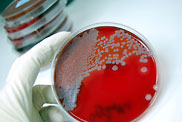
Bacterial culture Staph infection test - Photo credit: (c) iStockPhoto.com /Linde1
Almost every day I hear from someone afraid they might have MRSA or Staph because of the symptoms they have. Many people say they had never even heard of MRSA before they got sick. Unfortunately, many common Staph and MRSA symptoms are the same for other types of infections too.
The most common symptoms of Staph infection are red, swollen or tender pimple-like bumps, lumps or sores on the skin. People with more severe infections often have painful boils, abscesses and deeper tissue infections. The symptoms of MRSA are similar, but MRSA can spread and worsen quickly, often showing no improvement after taking antibiotics.
While looking at the symptoms of MRSA or Staph can be helpful, the only way to know if you are infected is to get a MRSA test.
How to get tested
Getting a MRSA test if easy and can be arranged through your doctor. The test is usually a quick swab sample taken from your nose, throat and/or from the infected area. Test results may take several days to get, but some newer tests can be done much faster. This test will show if your infection is caused by MRSA or another bacteria.
More and more hospitals are testing and screening for MRSA to manage and reduce its prevalence. But don’t expect your doctor to recommend a MRSA test to you just because you have some of the symptoms of Staph or MRSA.
MRSA and antibiotics
The standard protocol used by most doctors is to prescribe a broad-spectrum or “general-purpose” antibiotic for anything that looks like an infection. Doctors often use a trial and error approach with antibiotics, hoping to eventually find one that works.
The trouble is, MRSA will not respond well to many antibiotics. And taking antibiotics that don’t work is a waste of your time, money and an unnecessary drain on your immune system. MRSA can also continue growing during the use of an improper antibiotic.
That’s why MRSA testing is so important. Getting a MRSA test will help your doctor to prescribe antibiotics that have a better chance of working against your infection. But because MRSA testing is not always the standard protocol, you may have to ask your doctor to get yourself tested.
To your best health,
Michelle
Microbiologist and Natural Health Expert
Author of the Natural MRSA and Staph Treatment and Prevention Guidebook MRSA Secrets Revealed




